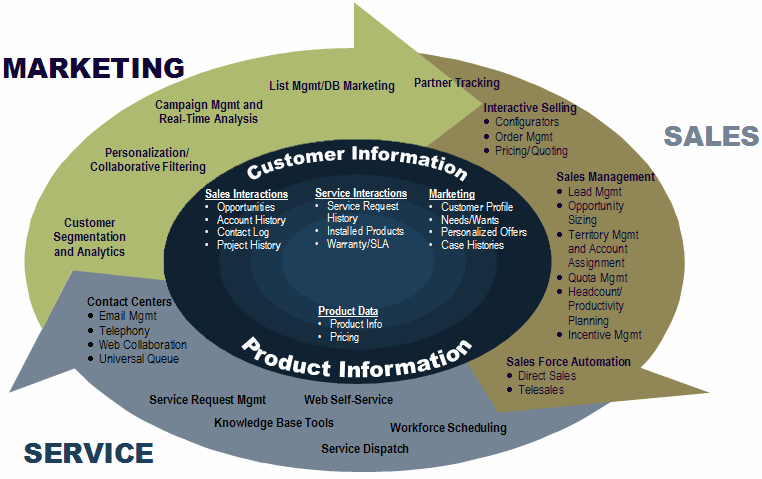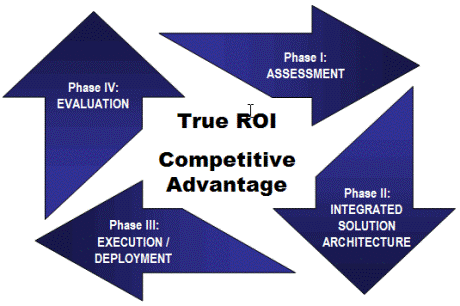
Aviant Group has extensive experience developing CRM strategies and implementing CRM solutions. This experience includes clients from a wide range of industries with revenues ranging from $10 million to $10 billion. Aviant has developed CRM strategies for clients that have sales forces with a handful of members to multi-national clients with thousands of users spread across the globe. With CRM there is no one-size-fits-all approach. Aviant's experience and technology agnostic approach enables us to develop and implement solutions that enable cliients to achieve a competitive advantage. True competitive advantage is only possible if CRM is viewed as more than just technology; it is a strategy that affects all parts of the organization.
Why Are Companies Turning to CRM?
CRM offers dramatic improvements in company performance through:
Sales, Marketing, Service
Vendors have been developing CRM tools and technologies that drive towards providing a 360° view of the customer to all facets of the enterprise.

CRM is a strategy, not just a technology
In order to realize the true benefits of CRM, an organization must evaluate and optimize its processes, personnel and all key business relationships - to build and maximize the relationship with its customers. CRM is a business strategy that:
CRM offers dramatic improvements in company performance through:
- Higher revenue per customer through more effective cross-selling and up-selling.
- Understanding and managing customer profitability.
- Higher customer retention and loyalty.
- Increased sales productivity.
- Personalized and customized service and support.
- Reduced marketing expense through improved target marketing.
- More effective proposals as a result of better access to historical information.
Sales, Marketing, Service
Vendors have been developing CRM tools and technologies that drive towards providing a 360° view of the customer to all facets of the enterprise.

CRM is a strategy, not just a technology
In order to realize the true benefits of CRM, an organization must evaluate and optimize its processes, personnel and all key business relationships - to build and maximize the relationship with its customers. CRM is a business strategy that:
- Identifies the firm's most valuable current or prospective customers and key business relationships.
- Differentiates these customers in terms of their values and needs.
- Customizes the firm's products and services to deliver the highest possible value in a profitable way.
- Focuses on integrating and implementing the processes, personnel and partners of your organization to achieve marketing, sales & service objectives.
- Aids the management of external relationships with channel partners, suppliers and other alliances that are critical to delivery of differentiated products / services.
- Continually monitors the customer's expectations and requirements so as to deliver products and services that will provide an unique customer experience and build a long-term relationship.
- Delivers a consistent message across the organization.
CRM Approach
The approach to CRM should be self-reinforcing and highly structured, while allowing for iteration and flexibility. Customers, technology and market changes require constant evaluation and consequently, organizational agility and adaptability to meet new requirements. CRM requires a coordinated, structured management approach:
- Business strategy that directs the CRM initiative through a value proposition that fully exploits CRM capabilities.
- Sales, service and marketing operational strategies that standardize business processes, personnel, data, channels and technology into an integrated enterprise.
- Human capital management strategy that generates the appropriate customer focused skills behaviors within the integrated enterprise.
- Alignment of organizational incentives and rewards which reinforces and drives behaviors and commitment to strategic and operational objectives.
- Technology strategy that evaluates the current technology infrastructure, the strategic and operational requirements and selects the appropriate CRM technologies and tools to complete the solution.
Phase IV
Phase III
- Results v. Plan
- Market Knowledge
- Issues / Resolution
Phase III
- Program Management
- Multi-Disciplinary Team
- Rapid Prototyping
- Change Management
- Quality Assurance

Phase I
Phase II
- Identify CRM Objectives and Opportunities
- Organizational Assessment
- Performance Review / Benchmarking (optional)
- Technology Strategy / Impact
Phase II
- Solution Model
- Detailed Process Design
- Fit-gap Analysis
- Detailed System Design
- Refined Cost / Benefit Calculation
- Implementation Roadmap
Causes of CRM Failures
Business Issues
- Lack of coherent CRM business strategy
- Lack of sales & marketing process change
- Lack of senior-level support
- Lack of training and internal support
- Poor measures of sales & marketing results
- Failure to adjust individual incentives & metrics
Technology Issues
- Lack of cross-functional planning
- Inappropriate IT investments
- Poor business representation on project team
- Poor vendor selection criteria
Ensuring CRM success
- Start with the Business Case.
- Must be based on financial measures targeted for improvement.
- Develop clear strategic objectives and a commitment to implement.
- Objectives must be clear, achievable and prioritized.
- Identify the necessary operational changes and impacts.
- Focus on acquisition, retention and penetration of key customers and alliances across touch points.
- Employ an implementation of personnel, process and technology that integrates:
- Process requirements
- Role criterion / enhancements
- Management activities
- Performance metrics
- Rewards & recognition
Change Management Factors Driving Success
- Sales people are being asked to use more technology, divulge "proprietary" information and provide information upstream that is valid and predictable.
- Fear of "Big Brother" must be addressed early and often.
- Mine the data collected to make sales reps more effective -- reward their efforts by helping them sell more.
- Marketing departments need to interact with IT more as analytical CRM grows within an organization.
- Marketing should be the guardians of the data in the CRM system.
- IT departments must acquire the resources and skills to manage and maintain the new CRM applications, supporting architecture and technologies.
CRM Trends
Sales Force Automation
- Provide sales people with the "tools they need for battle".
- Management of contacts, leads, opportunities, sales activities, opportunities, marketing collateral, time & expense reporting and reporting tools.
- Functionality aimed at managing a sales force have been introduced in the last few years.
- Territory management / account assignment, quota management and headcount / productivity planning.
- Tools have been developed to manage a notoriously manually intensive process.
- Quota programs based on account types or products can be managed for different sales groups or territories.
- The latest tools can manage "what-if" sales plans and ad-hoc queries, rapid changes of sales incentive programs, stimulate pay transactions and offer interactive reporting to sales people.
- Interactive selling tools aim to extend SFA and can manage selling interactions that require little to no participation from a sales person.
- Sales configurators and on-line pricing / quoting tools that can be used by internal sales people or directly by a customer.
- Proposals don't win work. Poor proposals DO lose work.
- The bar is continually being raised.
- Complete, accurate, and up to date information. Quality counts too!
- Multiple groups are coordinated with a common marketing message.
- Campaign logistics, budget and goals are documented.
- Response rates for can be automated to real-time measures.
- Real Time Marketing
- Allows the combination of past customer interactions, profitability measures and trend analysis with current information (call, web session) to adapt and make offers that will trigger a desired result.
- The integration of marketing functions and analytics has increased.
- Functional data marts with histories of customer interactions and behavior, revenues generated, costs incurred and demographic data can drive value for the marketing function.
- Customer intelligence "on-the-fly", data mining and better campaign management functions all become available to the enterprise through use of advanced analytics.
Analytics/Business Intelligence
Analytics are not new. The concept of the data warehouse and associated data marts has been around for awhile, but. . .
- Customer data is usually scattered over many systems within an organization.
- Often, they not are designed to be customer centric or are not very user friendly.
- Analytical CRM is based on creating data marts that store product information, customer profiles, customer interactions and other critical data.
- Effective use of analytics can allow an organization to:
- Perform effective segmentation of customers.
- Create models to understand the drivers of customer profitability.
- Perform exploratory analyses, and derive customer insights.
- Analyze customer behaviors and predict likely future behavior using statistical models.
- Drive campaign management, measure responses and marketing effectiveness.
- Assist and drive operational CRM components (sales, service, marketing) with customer information.
CRM Implementation Options
Enterprise vendors provide integrated back-office and front-office functionality for the entire enterprise
- Oracle
- PeopleSoft
- SAP
- JD Edwards
- Microsoft (SMB)
- Best Software (SMB)
- Siebel
- Clarify
- Sugar CRM
- E.piphany
- Onyx
- Deltek (Engineering and Construction)
- MarketSoft (Campaign Management, Lead Management, Territory Assignment)
- Selectica (Interactive Selling)
- Incentive Systems (Sales Compensation and Incentive Management
- Primus Knowledge Solutions (Web Self-Service, Knowledge Base Management)
- eGain (Customer Service, Email Management)
- NetSuite
- Salesforce.com
- Sugar CRM
- Offshore
- Domestic
- List Management
- Data aggregation and cleansing (common in Pharma)
- Marketing Analysis





